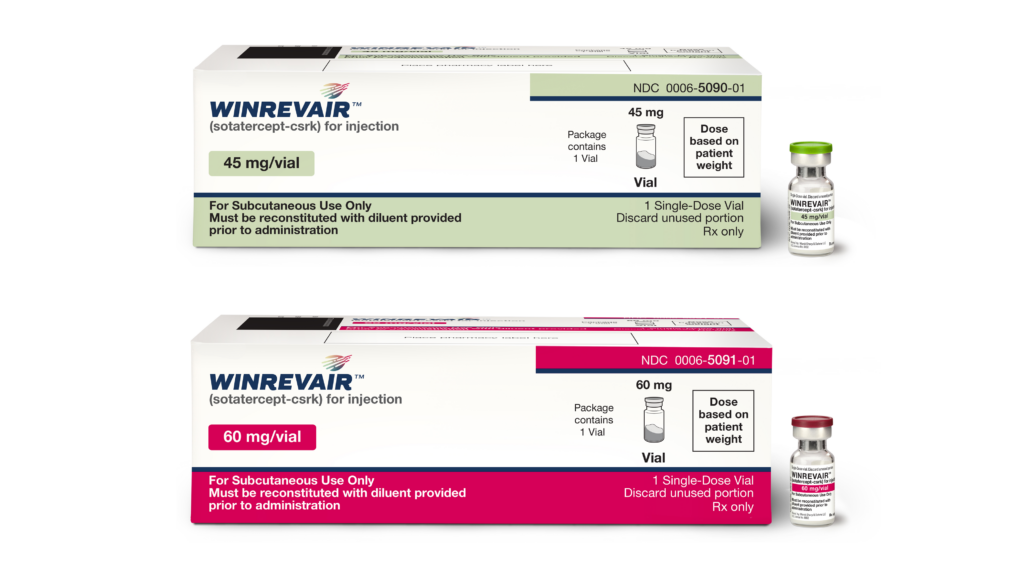The US Food and Drug Administration (FDA) has given the nod to Winrevair (sotatercept-csrk injection, 45mg, 60mg) for the treatment of adults with pulmonary arterial hypertension (PAH) to increase exercise capacity, improve WHO (World Health Organization) functional class (FC) and reduce the risk of clinical worsening events.
Winrevair is the first FDA-approved activin signaling inhibitor therapy for PAH, making it a new class of therapy for the disease.
PAH is a type of high blood pressure that affects the arteries in the lungs and the right side of the heart. It is characterized by the narrowing of pulmonary arteries, leading to increased resistance and pressure in the vessels. Symptoms often include shortness of breath, fatigue, dizziness and chest pain.
Winrevair is an activin signaling inhibitor that binds to activin proteins that are overproduced in PAH. The proteins induce the walls of blood vessels to grow and thicken over time, stressing the heart to work harder to pump blood which can eventually lead to heart failure.
Without treatment, individuals with PAH typically only survive about two to three years after diagnosis. Current treatment combinations include drugs that dilate or relax blood vessels, which largely only help with relieving symptoms and slowing disease progression to some degree.
Sotatercept was first developed by Acceleron and Celgene and evaluated as a treatment for conditions that included osteoporosis, anemia and multiple myeloma. The biologic was transferred to Merck in its $11.5 billion acquisition of Acceleron in 2021, which has proven fruitful just over two years later with an approval in a smaller but significant indication.
In a statement announcing the approval and describing the mechanism of action of the drug, Merck said Winrevair improves the balance between pro- and anti-proliferative signaling to regulate vascular cell proliferation underlying PAH, reversing vascular and right ventricle remodeling.
XTALKS WEBINAR: Improving Patient Recruitment Through Enhanced Data Visibility
Live and On-Demand: Monday, May 13, 2024, at 9am EDT (3pm CEST/EU-Central)
Register for this free webinar to gain insights into how supply chain management principles can be quickly applied to patient recruitment processes across clinical trials.
In the US, around 40,000 people have PAH and about 500 to 1,000 Americans are diagnosed with the condition each year. According to the American Lung Association, PAH affects more women (between the ages of 30 to 60) than men. Almost half of diagnosed patients die within five years of diagnosis. PAH begins as pulmonary hypertension (PH), a more common condition, and can then progress into PAH. Among the five different types of PH, PAH is referred to as Group 1.
“PAH is a rare, progressive and ultimately life-threatening disease in which blood vessels in the lungs thicken and narrow, causing significant strain on the heart,” said Dr. Marc Humbert, professor of Medicine and director of the Pulmonary Hypertension Reference Center at the Université Paris-Saclay and investigator on the Phase III STELLAR study.
“Based on the Phase III STELLAR trial, adding Winrevair to background PAH therapy demonstrated significant clinical benefits compared to background PAH therapy alone. This approval is an important milestone, as it offers healthcare providers a novel therapeutic option that targets a new PAH treatment pathway,” added Humbert.
Results of the Phase III STELLAR trial, which included 323 participants, showed that adding Winrevair to background therapy increased the six-minute walk distance from baseline by 41 meters at Week 24 compared to placebo. It also significantly improved several important secondary outcome measures, including reducing the risk of death from any cause or PAH clinical worsening events by 84 percent versus background therapy alone.
Outcomes for participants using sotatercept were significantly better compared to those on placebo. Only five percent, or nine participants, in the sotatercept group died or had disease progression, in contrast to 26 percent, or 42 participants, in the placebo group.
Related: Top 15 Cardiovascular Disease Drugs in 2023 by 2022 Sales Data
Merck said Winrevair will likely be available by the end of April through select specialty pharmacies in the US.
Merck has set the list price of Winrevair at $14,000 per vial. It is administered subcutaneously once every three weeks, which brings Winrevair’s annual cost to $238,000. Based on the label-recommended, weight-based target dose and clinical trial data, Merck estimates that about two-thirds of patients will use a single-vial kit while others will need a double-vial package.
“We believe the US price of Winrevair represents the significant innovation this medicine can deliver as a first-in-class activin signaling inhibitor therapy and the first biologic approved by the FDA for PAH,” Merck said in a statement.
Based on its calculations, the Institute for Clinical and Economic Review (ICER) came up with a price range of $17,900 and $35,400 per year, which is in line with the benefit patients are expected to receive for the treatment.
Sotatercept is also being evaluated in late-stage trials for PH due to left heart disease and for patients with PAH at intermediate or high risk of disease progression.
Winrevair was previously granted Breakthrough Therapy designation by the FDA.
Johnson & Johnson (J&J) currently dominates the PAH market with its prostacyclin receptor (IP) agonist Uptravi (selexipag) and endothelin receptor agonist Opsumi (macitentan). In 2023, sales of Uptravi hit $1.6 billion, a 20 percent increase from the previous year, while Opsumi brought in $2 billion, up 14 percent from 2022.
The PAH market was valued at $7.3 billion in 2023, with J&J having control of half of it. The market is projected to grow at a compound annual growth rate (CAGR) of 5 to 5.4 percent from 2023 to 2032 to hit $11.35 billion in 2032.
If you want your company to be featured on Xtalks.com, please email [email protected].












Join or login to leave a comment
JOIN LOGIN